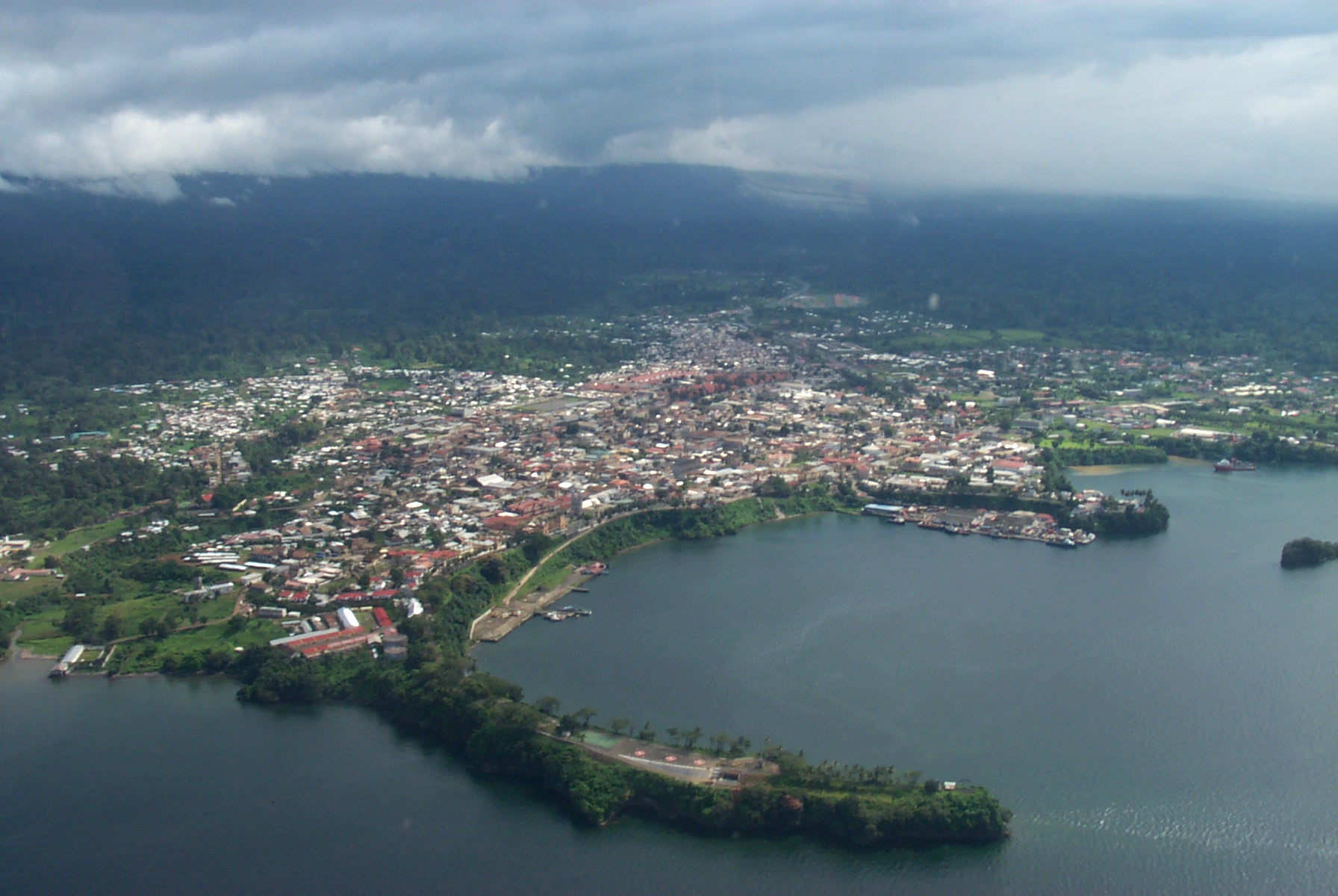You’ve probably overlooked it on a map. It’s the smallest country in Africa,
tucked in between the countries of Gabon and Cameroon. However, the capital is not on the mainland. It’s on an
island—Bioko Island—which is closer to the Cameroon port city of Douala. It seemed strange that the capital was so
far removed from the rest of the country, but then I suppose it might be a
strategic location. It’s certainly
a lot harder to take over your capital if you have to take a boat to get
there. Of course if you go
straight east from the mainland, you do come across an island, but it doesn’t
belong to Equatorial Guinea: it’s the island of Principe, as in the country of
São Tomé and Principe.
The mainland area is called Río Muni, named after the Muni
River. It has several national
parks and “ecoregions” spread across the mainland area and its several islands.
These areas contain lowland forests and highlands. There’s a definite rainy and dry season, although the
amounts vary depending on whether you live inland or on one of the
islands. One island, Annobón, sees
rain or mist every single day. I
guess it’s the Seattle of Equatorial Guinea.
The land was originally inhabited by pygmies, and after the
Great Bantu Migration, the Fang became the largest group to move into the area.
The Bubi people (yes, I momentarily turned fourteen, too) were thought to be
native to the island of Bioko. The
Portuguese were the first Europeans to discover Bioko Island and originally
called it Fernando Pó, after its discoverer. Portugal gave the rights over to Spain who controlled the
area from Buenos Aires, Argentina.
During the first part of the 1800s, the British set up a base on Bioko
Island for the slave trade, but then moved it to Sierra Leone after 16 years,
and it was left in control of the Creole elite. Various people from Cuba, Philippines, Spain, other
Portuguese islands started settling onto the island. In 1926, both Bioko Island and Río Muni were united as
Spanish Guinea. Cacao and coffee
plantations were the largest economic drivers, as well as a logging industry,
and the workforce was made up of immigrant workers from nearby countries. In 1959, these areas became a province,
rather than a colony. They finally
became the independent country of Equatorial Guinea in 1968. The first president, Francisco Macías
Nguema declared himself president for life and created a one-party government. During
the mid-1970s, the administration was accused of mass killings. It’s estimated
that of the 300,000 people in the country at that time, about 80,000 of them
were killed. Nguema’s nephew Teodoro
Obiang took over as president in a bloody coup in 1979 and is still the current
president. There are plans to
create a planned city in the middle of Río Muni in order to move the capital there
and will be called Oyala.
The current capital of Malabo lies on the northern end of
the island of Bioko. It’s actually
only the second-largest city in Equatorial Guinea; the city of Bata on the
mainland is larger. In 1996, large
oil reserves were discovered which has significantly changed its economy,
making Equatorial Guinea the third-largest oil producer in Sub-Saharan
Africa. The city of Malabo has
seen an increase in population, but it seems that very little of the money
generated from the oil industry is felt by the majority of the population. About half of the people still don’t
even have access to clean water.
The vast majority of the people identify themselves as
Christian. And of those people,
the majority is Roman Catholic with a small percentage as Protestant. About five percent of the people follow
other major religions such as Islam or Bahá’í as well as indigenous religious
beliefs.
Equatorial Guinea is the only country in Africa that lists Spanish as an official language (more specifically, Equatoguinean Spanish). Spanish is used in anything official, either from the government/administration or education. French is also considered an official language, probably based on their location among and commerce with many French-speaking countries. Because of the country’s history and ties to other Portuguese-speaking countries, the Portuguese language was added as a third official language several years ago. Most of the indigenous languages are in the Bantu family as well as some Portuguese creoles are spoken. English and German are common foreign languages that are studied in school.
What’s odd about this country is its name. Despite having the word “equatorial” in its name, the equator does not go through the country. The entire country is north of the equator except for the island of Annobón, which lies south of the island of São Tomé. Equatorial Guinea, a somewhat obscure country, has also been the setting of several novels. I haven’t read any of them, but I might try to find some. (I know, like I need more books. It’s kind of daunting how many I’ve amassed.) I’m kind of excited to explore this country that I had very little pre-knowledge prior to this, except that they speak Spanish. So, here goes nothing.
Up next:
holidays and celebrations






No comments:
Post a Comment